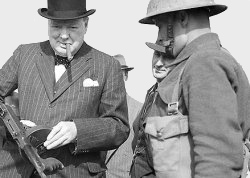 Faced with the GMC’s latest antics, Dr No was tempted to do an RDJ (rapid demolition job) on some of its sillier notions, such as ‘emotional resilience training’ for doctors to prepare them for fitness to practice investigations (‘General Turkey Council: toughness training for turkeys facing Christmas process’), but instead he offers another variation on a favourite line of his, borrowing from great orators of the past. Three quarters of a century ago, Britain stood against the Nazi menace; today the medical profession stands against the regulatory menace. What would Mr Churchill have said had he been the leader we so clearly lack today as our profession prepares to face the greatest menace in its long illustrious history?
Faced with the GMC’s latest antics, Dr No was tempted to do an RDJ (rapid demolition job) on some of its sillier notions, such as ‘emotional resilience training’ for doctors to prepare them for fitness to practice investigations (‘General Turkey Council: toughness training for turkeys facing Christmas process’), but instead he offers another variation on a favourite line of his, borrowing from great orators of the past. Three quarters of a century ago, Britain stood against the Nazi menace; today the medical profession stands against the regulatory menace. What would Mr Churchill have said had he been the leader we so clearly lack today as our profession prepares to face the greatest menace in its long illustrious history?
Sir— I avail myself with relief of the opportunity of speaking to the people. I do not know how long such liberties will be allowed. The stations of uncensored expression are closing down; the lights are going out; but there is still time for those to whom freedom and professional integrity mean something, to consult together. Let me, then, speak in truth and earnestness while time remains.
One may put the question before us in the largest form. Has any benefit or progress ever been achieved by a profession by submission to organised and calculated violence? As we look back over the long story of our profession we must see that, on the contrary, its glory has been founded upon the spirit of resistance to tyranny and injustice, especially when these evils seemed to be backed by heavier force. Since the dawn of the Modern era a certain way of life has slowly been shaping itself among our peoples, and certain standards of conduct and government have come to be esteemed. After many miseries and prolonged confusion, there arose into the broad light of day the conception of the right of the individual; his right to be consulted in the government of his country; his right to invoke the law even against the State itself.
We are confronted too with another theme. It is not a new theme; it leaps out upon us from the Dark Ages – racial persecution, professional intolerance, deprivation of free speech, the conception of the doctor as a mere soulless fraction of the State. To this has been added the cult of war. Regulators are taught from their earliest training the delights and profits of conquest and aggression. A whole mighty community has been drawn into a warlike frame. They are held in this condition by a regulatory cabal who derive all kinds of profits from the upkeep of the regulatory regime. Like all totalitarians, the regulators tolerate no opinion but their own. Like all totalitarians, they feed on hatred. Like all totalitarians, they must seek, from time to time, and always at shorter intervals, a new target, a new prize, a new victim. The Dictator, in all his pride, is held in the grip of his regulatory machine. He can go forward; he cannot go back. He must blood his hounds and show them sport, or else, like Actaeon of old, be devoured by them. All-strong without, he is all-weak within. As Byron wrote a hundred years ago: "These Pagod things of Sabre sway, with fronts of brass and feet of clay."
No one must underrate the power and efficiency of this totalitarian regulatory state. Where the whole of a great profession, amiable, good-hearted, peace-loving people, are gripped by the neck and by the hair by a regulatory tyranny the rulers for the time being can exercise a power for the purposes external domination before which ordinary free doctors are at a grievous practical disadvantage. We have to recognise this.
The culminating question to which I have been leading is whether the profession as we have known it – the great and hopeful world of medicine, the world of increasing hope and health for the common man, the world of honoured tradition, humane art and expanding science – should meet this menace by submission or by resistance.
Today, across the profession, the lights are going out. As the regulatory tyranny tightens its grip, and throttles life from the profession, a counsel of despair rides large across the land. The once independent lie cowed and subdued, while those already of a weaker nature capitulate, feeding the crocodile, each one hoping that if he feeds the crocodile enough, the crocodile will eat him last.
But there is another way. Centuries ago, Alexander the Great remarked that the people of Asia were slaves because they had not learned to pronounce the word "No." There, in one single word, is the resolve which the forces of freedom and progress, of tolerance and good will, should take, if a once proud and noble profession is not to beaten into a cowering and useless shadow of its once great former self.
And, you know what struck Dr No as he compiled this post? Just how few words he had to change to transform a 1938 speech against national tyranny into a 2015 speech against professional tyranny.
